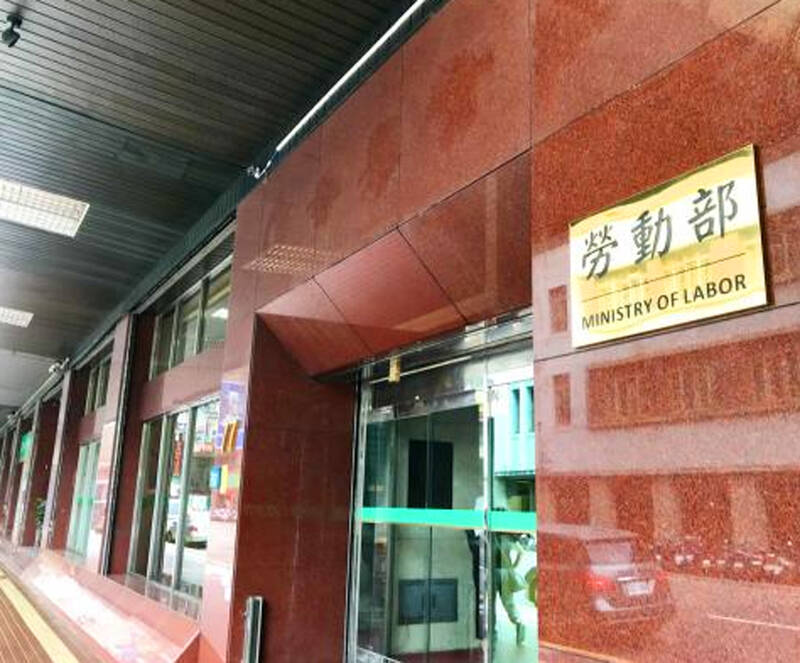Guidelines released by the Ministry of Labor to better inform female migrant workers who are pregnant or have young children about their rights in Taiwan have drawn mixed responses from civic groups.
The guidelines, released on Tuesday, bring together information scattered across the jurisdictions of several government agencies that female migrant workers can refer to when they become pregnant.
For example, one regulation states that they can reach a mutual agreement to dissolve their contract with their employer after they become pregnant and they are entitled to a 60-day leeway period to rest after childbirth before they have to start looking for a new employer.

Photo: Li Ya-wen, Taipei Times
The document is available in Chinese, English, Indonesian, Vietnamese and Thai.
The guidelines drew criticism from the International Association of Family and Employers with Disabilities, which described them as “intentionally playing up the importance of migrant workers’ families” and “neglecting the mission of their jobs.”
The primary goal for migrant workers who have come to Taiwan should be to work, not to have children, the association said in a statement on Wednesday.
The ministry should immediately rescind the guidelines, which put the rights of women and children before the needs of families that recruit live-in caregivers, infringing upon their welfare, it said.
In response, the ministry said that migrant workers have the same rights as Taiwanese workers to decide whether to have children and, like their Taiwanese counterparts, are protected by the Gender Equality in Employment Act (性別平等工作法), which governs maternity leave and other applicable laws.
Crucially, the guidelines also point employers of migrant live-in caregivers to short-term and respite care services, which they can use if their caregiver becomes pregnant, the ministry said.
The guidelines do not undermine the rights of people who hire migrant workers, it said, adding that it would discuss with the Ministry of Health and Welfare how to improve existing supplementary care services to better address the needs of people should their caregiver become pregnant.
Serikat Buruh Industri Perawatan Taiwan, a union made up of Indonesian caregivers working for Taiwanese families and in nursing homes, said it respected the association’s opinion and acknowledged that pregnant caregivers could put care recipients and themselves in danger if they continue to work.
However, the Gender Equality in Employment Act and international anti-discrimination conventions have been enshrined into local law to prohibit the dismissal of pregnant workers, the union said on Thursday.
Despite those efforts, sexual discrimination still exists, the union said.
If certain groups disregard the rights of migrant workers to become pregnant and flout international conventions, their suitability to hire such workers should be questioned, and they risk tarnishing the image of their nation, it said.
Lee Kai-li (李凱莉), a director in charge of migrant affairs at the Garden of Hope Foundation, commended the labor ministry for publishing the guidelines, which she said conveniently bring together the majority of regulations regarding migrant workers.
However, she said there is a major omission — the document neglects to mention the legal liability of employers should they break the regulations.
Noting that many employers who illegally fire pregnant migrant workers have gone unpunished after paying severance, Lee said she hoped that the guidelines would serve as a reminder to the authorities that the law must be enforced.

An essay competition jointly organized by a local writing society and a publisher affiliated with the Chinese Communist Party (CCP) might have contravened the Act Governing Relations Between the People of the Taiwan Area and the Mainland Area (臺灣地區與大陸地區人民關係條例), the Mainland Affairs Council (MAC) said on Thursday. “In this case, the partner organization is clearly an agency under the CCP’s Fujian Provincial Committee,” MAC Deputy Minister and spokesperson Liang Wen-chieh (梁文傑) said at a news briefing in Taipei. “It also involves bringing Taiwanese students to China with all-expenses-paid arrangements to attend award ceremonies and camps,” Liang said. Those two “characteristics” are typically sufficient

A magnitude 5.9 earthquake that struck about 33km off the coast of Hualien City was the "main shock" in a series of quakes in the area, with aftershocks expected over the next three days, the Central Weather Administration (CWA) said yesterday. Prior to the magnitude 5.9 quake shaking most of Taiwan at 6:53pm yesterday, six other earthquakes stronger than a magnitude of 4, starting with a magnitude 5.5 quake at 6:09pm, occurred in the area. CWA Seismological Center Director Wu Chien-fu (吳健富) confirmed that the quakes were all part of the same series and that the magnitude 5.5 temblor was

The brilliant blue waters, thick foliage and bucolic atmosphere on this seemingly idyllic archipelago deep in the Pacific Ocean belie the key role it now plays in a titanic geopolitical struggle. Palau is again on the front line as China, and the US and its allies prepare their forces in an intensifying contest for control over the Asia-Pacific region. The democratic nation of just 17,000 people hosts US-controlled airstrips and soon-to-be-completed radar installations that the US military describes as “critical” to monitoring vast swathes of water and airspace. It is also a key piece of the second island chain, a string of

The Central Weather Administration has issued a heat alert for southeastern Taiwan, warning of temperatures as high as 36°C today, while alerting some coastal areas of strong winds later in the day. Kaohsiung’s Neimen District (內門) and Pingtung County’s Neipu Township (內埔) are under an orange heat alert, which warns of temperatures as high as 36°C for three consecutive days, the CWA said, citing southwest winds. The heat would also extend to Tainan’s Nansi (楠西) and Yujing (玉井) districts, as well as Pingtung’s Gaoshu (高樹), Yanpu (鹽埔) and Majia (瑪家) townships, it said, forecasting highs of up to 36°C in those areas